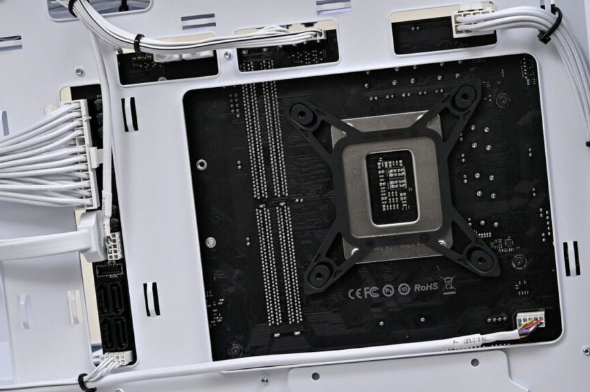Connection to DriversCloud Create a DriversCloud.com account Reset your DriversCloud.com password Account migration
When ASUS and MSI try to hide the internal cables of our PCs
Moving the motherboard connectors to the back seems to be the preferred way to go.
One after the other, two of the main manufacturers of motherboards - but also of many other components - have decided to address the issue of internal computer wiring. ASUS and MSI have indeed decided to hide as much as possible these unsightly cables in order to give the illusion of machines with an impeccable finish. On paper, this should also simplify assembly and avoid having an impressive mass of cables to run in all directions.
Almost two years ago, Gigabyte presented a similar concept, but the Project Stealth has never been released. The ASUS project seems to be well underway, so much so that the TUF Gaming B760M-BTF motherboard is clearly highlighted on the brand's official website. It is a motherboard in micro-ATX format and based on the Intel B760 chipset designed for the American's LGA1700 processors (Alder and Raptor Lake). It has four slots for DDR4-5333 and three PCI Express ports (1x PCIe 5.0 x16, 1x PCIe 4.0 x4 and 1x PCIe 4.0 x1). In addition, three M.2 ports (PCIe 4.0 x4) and four SATA 6 Gb/s ports complete the product. The latter have the particularity of being on the back of the motherboard. Just like the 24-pin power connector, the various sockets for the fans, the internal USB connectors and all other connections.
The idea is interesting, but a simple look at this motherboard must raise a question in all the regulars of PC assembly: a compatible case is obviously necessary. The connectors on the back of the motherboard are closer and more accessible from the power supply, but the board's support must have the necessary cutouts for the various cables. The overwhelming majority of cases on the market today are simply not able to accommodate this motherboard. Of course, ASUS has not neglected this aspect of things and is already working on adapted cases, as we were able to see in a slightly roundabout way.
Indeed, while MSI's project - similar to ASUS's in terms of content and form - has not yet been made official, several pictures have leaked in the last few days. We can see that MSI is working on two motherboard models of the B650 DIY-APE range. Two models that are well advanced since, according to TechPowerUp, they have already entered the so-called "qualification" phase. It's not about marketing them yet, or even putting them forward on MSI's official website, but the progress shows that the company is determined to push the concept forward. In another shot, we see the motherboards installed in cases signed SAMA on one side and... ASUS on the other! No doubt some users will find this research useless, while others - specialists in cable mods - will be sad to hide them in this way.









